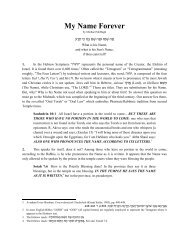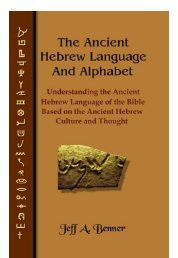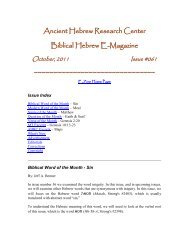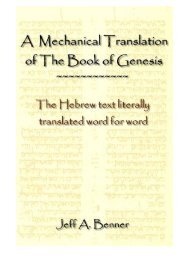Dating the Book of Job (PDF) - Ancient Hebrew Research Center
Dating the Book of Job (PDF) - Ancient Hebrew Research Center
Dating the Book of Job (PDF) - Ancient Hebrew Research Center
You also want an ePaper? Increase the reach of your titles
YUMPU automatically turns print PDFs into web optimized ePapers that Google loves.
<strong>Dating</strong> <strong>the</strong> <strong>Book</strong> <strong>of</strong> <strong>Job</strong> 13<br />
The question <strong>of</strong> whe<strong>the</strong>r <strong>the</strong> 12-generation or <strong>the</strong> 6-generation model is more likely for <strong>the</strong><br />
Israelites’ stay in Egypt boils down to a question <strong>of</strong> whe<strong>the</strong>r it seems more reasonalbe that <strong>the</strong><br />
<strong>Hebrew</strong>s were, on average, having family sizes <strong>of</strong> 2-point-something children or over 10 children.<br />
An average <strong>of</strong> 2 or 3 children per family is more typical <strong>of</strong> modern western cultures, but not for<br />
<strong>the</strong> culture <strong>of</strong> <strong>the</strong> time in question. Consider that Jacob, <strong>the</strong> forefa<strong>the</strong>r <strong>of</strong> <strong>the</strong> Israelites, had 12 sons<br />
(Genesis 35:22-26) and, after <strong>the</strong> Israelites had been delivered from Egypt, when <strong>the</strong>y dwelt in <strong>the</strong><br />
promised land during <strong>the</strong> time <strong>of</strong> <strong>the</strong> Judges, Ibzan and Abdon, <strong>the</strong> 10th and 12th judges <strong>of</strong> Israel<br />
respectively, had 60 and 40 children respectively. Consider also that we are told that <strong>the</strong> Israelites<br />
were having large families during <strong>the</strong>ir stay in Egypt (Exodus 1:7). That <strong>the</strong> Israelites were having<br />
large families is important to <strong>the</strong> storyline <strong>of</strong> <strong>the</strong> Exodus as it is given as <strong>the</strong> reason for <strong>the</strong> Egyptians<br />
turning on <strong>the</strong> Israelites (Exodus 1:8-22).<br />
– And Joseph died, all his bro<strong>the</strong>rs, and all that generation. But <strong>the</strong> children <strong>of</strong> Israel were fruitful and increased<br />
abundantly, multiplied and grew exceedingly mighty; and <strong>the</strong> land was filled with <strong>the</strong>m. Now <strong>the</strong>re arose a new<br />
king over Egypt, who did not know Joseph. And he said to his people, “Look, <strong>the</strong> people <strong>of</strong> <strong>the</strong> children <strong>of</strong> Israel<br />
are more and mightier than we; come, let us deal shrewdly with <strong>the</strong>m, lest <strong>the</strong>y multiply, and it happen, in <strong>the</strong><br />
event <strong>of</strong> war, that <strong>the</strong>y also join our enemies and fight against us, and so go up out <strong>of</strong> <strong>the</strong> land.” Therefore <strong>the</strong>y<br />
set taskmasters over <strong>the</strong>m to afflict <strong>the</strong>m with <strong>the</strong>ir burdens. And <strong>the</strong>y built for Pharaoh supply cities, Pithom<br />
and Raamses. But <strong>the</strong> more <strong>the</strong>y afflicted <strong>the</strong>m, <strong>the</strong> more <strong>the</strong>y multiplied and grew. And <strong>the</strong>y were in dread<br />
<strong>of</strong> <strong>the</strong> children <strong>of</strong> Israel. So <strong>the</strong> Egyptians made <strong>the</strong> children <strong>of</strong> Israel serve with rigor. And <strong>the</strong>y made <strong>the</strong>ir<br />
lives bitter with hard bondage—in mortar, in brick, and in all manner <strong>of</strong> service in <strong>the</strong> field. All <strong>the</strong>ir service<br />
in which <strong>the</strong>y made <strong>the</strong>m serve was with rigor. Then <strong>the</strong> king <strong>of</strong> Egypt spoke to <strong>the</strong> <strong>Hebrew</strong> midwives, <strong>of</strong><br />
whom <strong>the</strong> name <strong>of</strong> one was Shiphrah and <strong>the</strong> name <strong>of</strong> <strong>the</strong> o<strong>the</strong>r Puah; and he said, “When you do <strong>the</strong> duties <strong>of</strong> a<br />
midwife for <strong>the</strong> <strong>Hebrew</strong> women, and see <strong>the</strong>m on <strong>the</strong> birthstools, if it is a son, <strong>the</strong>n you shall kill him; but if it is<br />
a daughter, <strong>the</strong>n she shall live.” But <strong>the</strong> midwives feared God, and did not do as <strong>the</strong> king <strong>of</strong> Egypt commanded<br />
<strong>the</strong>m, but saved <strong>the</strong> male children alive. So <strong>the</strong> king <strong>of</strong> Egypt called for <strong>the</strong> midwives and said to <strong>the</strong>m, “Why<br />
have you done this thing, and saved <strong>the</strong> male children alive?” And <strong>the</strong> midwives said to Pharaoh, “Because <strong>the</strong><br />
<strong>Hebrew</strong> women are not like <strong>the</strong> Egyptian women; for <strong>the</strong>y are lively and give birth before <strong>the</strong> midwives come<br />
to <strong>the</strong>m.” Therefore God dealt well with <strong>the</strong> midwives, and <strong>the</strong> people multiplied and grew very mighty. And<br />
so it was, because <strong>the</strong> midwives feared God, that He provided households for <strong>the</strong>m. So Pharaoh commanded<br />
all his people, saying, “Every son who is born you shall cast into <strong>the</strong> river, and every daughter you shall save<br />
alive.” (Exodus 1:6-22 NKJV)<br />
All o<strong>the</strong>r environmental conditions being equal (e.g. available food, housing, wea<strong>the</strong>r conditions,<br />
&c.), <strong>the</strong> average family size will be a cultural trend and will tend to be consistent over many<br />
generations. The account <strong>of</strong> <strong>the</strong> Israelites’ behavior shortly after <strong>the</strong>y had left Egypt also gives us<br />
a glimpse into <strong>the</strong>ir culture.<br />
– Then <strong>the</strong>y rose early on <strong>the</strong> next day, <strong>of</strong>fered burnt <strong>of</strong>ferings, and brought peace <strong>of</strong>ferings; and <strong>the</strong> people sat<br />
down to eat and drink, and rose up to play. (Exodus 32:6 NKJV)<br />
Exodus 32:9-10, 34:14-17 and I Corinthians 10:7 make it clear that <strong>the</strong> “eating” and “playing”<br />
as used in <strong>the</strong> above passage are euphemisms for idolatry and harlotry.<br />
– And <strong>the</strong> LORD said to Moses, “I have seen this people, and indeed it is a stiff-necked people! Now <strong>the</strong>refore,<br />
let Me alone, that My wrath may burn hot against <strong>the</strong>m and I may consume <strong>the</strong>m. And I will make <strong>of</strong> you a<br />
great nation.” (Exodus 32:9-10 NKJV)<br />
– (for you shall worship no o<strong>the</strong>r god, for <strong>the</strong> LORD, whose name is Jealous, is a jealous God), lest you make a<br />
covenant with <strong>the</strong> inhabitants <strong>of</strong> <strong>the</strong> land, and <strong>the</strong>y play <strong>the</strong> harlot with <strong>the</strong>ir gods and make sacrifice to <strong>the</strong>ir<br />
gods, and one <strong>of</strong> <strong>the</strong>m invites you and you eat <strong>of</strong> his sacrifice, and you take <strong>of</strong> his daughters for your sons, and






